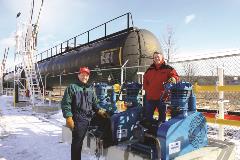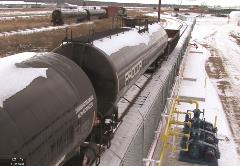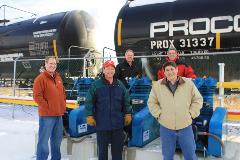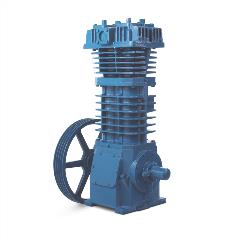WENNER GAS TERMINAL HITS THE GROUND RUNNING AND ADDS TO THE FAMILY LEGACY WITH THE HELP OF LPG & NH3 SUPPLY AND BLACKMER® PUMPS AND COMPRESSORS
By Bill Holmes
Since the 1880s, the Wenner name has been a diversely ever-present one in the business community of the central Minnesota (USA) city of Cold Spring, a burg with around 3,000 residents located 60 miles northwest of the Twin Cities.
“Our hardware store started as a general store in the 1880s,” explained Carl Wenner, who, along with his brother Pat, make up the fourth generation to oversee the family businesses. “In Minnesota at that time, when somebody would die they would go to the general store to get nails and wood to build a coffin, so that’s how we also got to be a funeral home.”
Today, Wenner Do It Best® Hardware & Rental is a mainstay at the corner of Main Street and Red River Avenue North in downtown Cold Spring, while the Wenner Funeral Home has a pair of locations, one on Red River Avenue South along a scenic tributary of the Mississippi River that feeds the Sauk River, and the second in the neighboring town of Richmond, about five miles to the west on Hwy 23.
After laying its hardware and funeral home foundation, in the 1940s the Wenners expanded into the energy business.
“My grandfather started selling 100-pound cylinders of LPG then and we’ve been in the propane business ever since,” said Carl Wenner.
To facilitate this business, the Wenner family opened a small LPG bulk-storage operation just south of downtown Cold Spring along the railroad tracks that parallel Hwy 23. Over the years, the propane business grew to the point where the storage facility required four storage tanks to meet customer demand, while the Wenners made deliveries via a trio of bobtails. Wenner’s bobtails were manufactured by Arrow Tank and Engineering Co., Inc., Minneapolis, MN, USA, which, since 1957, has been providing deliverers of bulk LPG. The LPG business had also advanced to the level where the Wenners knew they would have to expand the facility if they were to meet the needs of a growing customer base. However, when they approached the city with some preliminary plans for expansion, they found that the city had other ideas.
“We wanted to expand our existing facility in Cold Spring, but the city didn’t want us to do it, and the school district, which combines the cities of Cold Spring, Richmond and Rockville, wanted to use the railroad track as a trail that connects the three cities,” said Carl Wenner. “We knew that we would have to build a new facility if we wanted to use rail to get any LPG supply.”
Those circumstances led to one of the most audacious decisions the Wenner family has made in its 130 years of doing business.
Rolling the Dice
“I thought it was a pipe dream,” recalled Jeff Munzel, Vice President of LPG & NH3 Supply, Inc. Located in Buffalo, MN, USA, about 30 miles southeast of Cold Spring, LPG & NH3 has been supplying equipment and service for the propane and anhydrous ammonia markets in the Midwest since 1976. “I knew that rail service to downtown Cold Spring was going to cease, but I still didn’t expect them to do it.”
What the Wenners did – in 2009, with the country caught in the grip of a stubborn economic recession – was acquire an 11-acre parcel of property up Hwy 23 to the northeast of Cold Spring near St. Cloud and devise plans to build the Wenner Gas Terminal. This new terminal would be an LPG storage and transfer facility complete with a newly built rail spur that would allow railcars filled with LPG to dock so that they could be unloaded into storage tanks. The plans called for eight storage tanks – six 40,000-gallon tanks and two 30,000-gallon tanks – to be installed, which would give the facility a total storage capacity of 300,000 gallons of LPG. Wenner Gas would then contract with companies that would send transports to the facility where they would be loaded for delivery with the stored LPG. While Wenner Gas wouldn’t actually be selling the LPG, it would be paid one fee to unload the railcars, a second fee to store it and a final fee to load the transports.
“I knew that if we were going to move, we might as well make it big enough so that it would be worthwhile,” said Pat Wenner. “We needed a facility that had rail access and would be big enough for trucks from other companies to use. It’s also less than two miles from Interstate 94 and right along Hwy 23, so it’s easy to get to.”
After jumping through the requisite regulatory, permitting and land-use hoops, and securing the proper financing, ground was broken on the Wenner Gas Terminal on Sept. 29, 2010. Just more than three months later, on Jan. 3, 2011, the gates were opened for business, with Carl Wenner serving as President of the new subsidiary and Pat Wenner listed as Vice President. Playing a key role in the successful construction of the facility was Munzel and LPG & NH3.
“I’m still kind of shocked that they did it,” marveled Munzel. “We’ve known the Wenners for 35 years, but they were just a small, independent marketer of propane. We had thrown out some preliminary numbers a few years back when they first talked about a new facility. Then, when they decided to move forward with the terminal we were very interested in bidding the project because we had been involved from the start. When we got the project it was full speed ahead.”
The heart of the project involved installing the storage tanks, as well as building a pair of rail towers (a third was added in June 2011) under which the railcars would be parked when they were unloaded. When addressing the storage tanks, the Wenners requested that LPG & NH3, which was partnering with Westmor Industries, Morris, MN, on the construction of the tanks, deliver six tanks with a non-standard capacity of 40,000 gallons, rather than going with a more typical four 60,000-gallon tanks.
“We requested 40s rather than 60s, because, first, the 60s would have cost more, and, second, it was easier to ship the 40s to the site, which was also cheaper for us,” explained Pat Wenner. “So we were able to get the total capacity we wanted at the tank bank, the 300,000 gallons, at a lesser overall cost.”
Though Wenner’s request for 40,000-gallon storage tanks was unique at the time, there is a growing trend in the industry for LPG handlers to look to tanks smaller than 60,000 gallons for their storage needs, mainly due to the ease of shipping and reduced costs.
The Finishing Touches
A key part of the Wenner Gas Terminals’s infrastructure are the compressors used to unload LPG from the railcars into a series of storage tanks. Pumps are then used to transfer the LPG from the storage tanks into transports and bobtails that deliver it to the end-user. From the beginning, Munzel knew there was only one company that would supply the compressors and pumps for these critical operations – Blackmer®, headquartered in Grand Rapids, MI, USA.
“It was very easy to get them to go with Blackmer since they knew that we were distributors of Blackmer LPG products,” said Munzel. “In the past, they had bought some smaller cylinder pumps and some skid-dispenser units with 1-inch Blackmer pumps, and their bobtails also have Blackmer pumps on them. They rely on us as their equipment experts and they trusted that we’d supply them with the best equipment for their needs.”
The setup of the terminal requires one compressor for each rail tower, so LPG & NH3 initially installed a pair of Blackmer Model LB601 Reciprocating Gas Compressors and then added another when the third rail tower came online last summer. The LB601 compressors are ideal for the terminal’s LPG railcar-unloading operations because they offer an oil-free design with the unique ability to do both liquid transfer and vapor recovery after the tank’s liquid is emptied.
LB601 compressors also feature ductile-iron construction that make them stronger and more resistant to thermal shock and corrosion than cast iron, resulting in long-life reliability. Leak-free operation is ensured by the presence of O-rings instead of gaskets on all of the pressure-containing parts. Case-hardened steel valves and stainless-steel discs and springs are easily removed without having to disturb the piping. Finally, the suction valve can be configured as either an input or discharge valve, which simplifies the stocking of spare parts. The modular design of the Blackmer compressors also simplifies the stocking of spare parts. To illustrate the confidence Blackmer has in the performance of its LPG products – all of which are cast and machined at its Michigan facility and are American made – it offers the longest warranty in the business, 36 months, as well as a One-Year Performance Assurance that provides free replacement parts during the first 12 months of operation.
Maybe most important, the LB601 compressors are enabling the Wenner Gas Terminal to optimize its railcar-unloading times.
“We had a smaller compressor at the Cold Spring facility that would take seven hours minimum to unload a car,” said Pat Wenner. “Now, with the three towers at the new facility, and the larger Blackmer compressors, we can unload three cars at once in a total of five hours.We can also take the pressure of the compressors down to under 10 psi, so we’re also recovering more vapor than ever before. This ability to unload the liquid faster, and capture nearly all the vapors has significantly improved our profitability. We’re very happy with our Blackmer compressors.”
At the other end of the operation, LPG & NH3 installed a pair of Blackmer Model LGL4 Sliding Vane Pumps that feed the dual-transport loading island. These 4-inch pumps deliver a flow rate up to 560 gpm and enable the terminal to load a 10,000-gallon transport in 18 to 20 minutes with the ability, according to Pat Wenner, to configure the pumps’ operation to get the load time down to 15 minutes per transport when they are at the height of the crop-drying or heating seasons.
“When you have that much LPG coming in and going out, load times like that are essential because the transport drivers do not have to sit in lines like they do at other terminals,” said Munzel.
The LGL4 pumps can meet the needs of the Wenner Gas Terminal because they have been designed for maximum performance and reliability under the most severe operating conditions. Standard features include cavitation suppression liners that reduce noise, vibration and wear; replaceable casing liners and end discs; ductile-iron construction with internal relief valves; self-priming and dry-run capabilities; and vanes that can be replaced without removing the pump from the piping system, which eliminates maintenance concerns and costly downtime.
“The Blackmer pumps and compressors have been very reliable and have really performed up to our expectations,” said Carl Wenner. “The warranty also increases our peace of mind, though we haven’t needed to use it.”
Conclusion
To say that the Wenner Gas Terminal has been a success from day one would be an understatement. Despite a relatively quiet crop-drying season last summer and a mild start to winter 2011-12, the Wenners had an estimated seven million gallons of LPG pass through their facility in 2011. This amount was buttressed by the supply contracts they signed early on with CHS, Inc., the huge farm cooperative that has operations in nine Upper Midwestern states, and Plains Marketing, a subsidiary of Plains All American Pipeline that is involved in the transportation, storage, terminaling and marketing of LPG. The terminal also benefited from the increased oil-and-gas exploration and production in the Bakken Oil Shale formation in North Dakota, Montana and southern Canada. The Wenners receive most of their railcars from the Bakken versus areas further away.
The Wenners were also not only brave in going ahead with their plans for the Wenner Gas Terminal, but they had the foresight to build it on a piece of property that is large enough to be expanded to five rail towers, which could eventually give them an annual throughput of more than 20 million gallons of LPG.
“It’s turned out to be just a diamond in the rough that is located in the perfect area that their customers love, and it can only get better since they had the foresight to develop an expansion plan that looks like it might be coming to fruition,” said Munzel. “They’ve also been very, very happy with the performance of the Blackmer pumps and compressors; they’ve actually exceeded their expectations. This is just a story of one of your small town, multi-generational companies that saw an opportunity and has taken full advantage of it.”
About The Author:
Bill Holmes is the Regional Director of Energy & Transfer in the USA and Canada, for PSG®, Downers Grove, IL, USA. He can be reached at (847) 726-7565 or bill.holmes@psgdover.com. For more information on Blackmer’s full line of pumps and compressors, please go to blackmer.com or call (616) 241-1611. PSG is comprised of several leading pump brands – Almatec,® Blackmer,® EnviroGear,® Griswold,™ Maag,® Mouvex,® Neptune,™ Quattroflow™ and RedScrew™ and Wilden.® You can find more information on PSG at psgdover.com.

Pat and Carl Wenner took a risk when they decided to build the Wenner Gas Terminal in 2009, but have realized instant success with the facility. A trio of Blackmer® LB601 Reciprocating Gas Compressors have played a crucial role in that success.

The Wenners had a special rail spur built for the LPG railcars that would supply the Wenner Gas Terminal.

L to R: Chad Pendill (LPG & NH3), Pat Wenner, Jeff Munzel (LPG & NH3), Bill Holmes (PSG), Carl Wenner
The Wenner Gas Terminal serves as a supply depot for Wenner’s fleet of LPG bobtails, as well as customers like CHS, Inc., which is one of the country’s largest transporters of LPG.

Blackmer® Model LB601 Reciprocating Gas Compressor